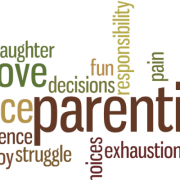
There are so many places to get parenting advice. Your friends, your doctors, your mother, everyone has something to say about the best way to raise a kid. I don't claim to have a monopoly on advice but I do have a unique perspective that is informed by both my training and my years of watching the results of all sorts of parenting decisions as they play out in people's lives.
Here are my five most important thoughts, in no particular order.
Be as okay with yourself as you can
You don't have to be perfectly mentally balanced to have a kid. If that was the case, no one could have any. However, if you are struggling hard with depression, anxiety or trauma, do your best to get some assistance as soon as you can. If you put your own caretaking on hold because you are attending to a child, that isn't as helpful as you might think. Parents do impact their children and it's hard to fake it. Children know things and they know them at deep levels that they may not be able to articulate. They know you are suffering. It isn't about being perfect, it's about taking care of yourself.
Listen and reflect
As children grow and develop, they are looking for connection to the adults around them. Every adult's job is to take the time and attention to see and understand what is happening for that child and then to somehow reflect back that you see and understand. It could be as simple as noticing they are excited about cake, "Wow! That is some great cake isn't it?!". It could be as hard as noticing that something isn't quite right, "You seem like you are feeling some hard feelings right now". Try as best as you can to see the world from their eyes and to understand it as they do. Remember that they don't know all the things you know and they have to learn by experience, with help to make sense of it all. You can tell them how it should be but unless you are also letting them know that you know how it is for them, you are not keeping the connection and communication you need when things get more complicated.
All feelings are real
Feelings are just that, feelings. We experience them and there isn't a lot we can do to avoid them nor do we want to. They are good information. Practice with yourself and your child naming all the feelings they have as you notice them having them. We certainly have to help our child contain or get through feelings sometimes. Anger and frustration can be expressed in destructive ways that need to be moderated or redirected. However, be careful not to make some feelings unacceptable. When a child knows there is no room to feel fear or anger or sadness, they will try not to. But the ways that children supress emotions usually result in unhealthy coping mechanisms as adults. We may encourage a child to suppress an emotion if we are also uncomfortable with it. So if sadness wasn't allowed in your growing up, you may have trouble when your child is sad. That could be a cue to you to take care of yourself and the meaning this has for you (see above: Be as okay with yourself as you can).
Express and teach empathy
Empathy is the ability to understand the feeling state of another person in a way that resonates within our own bodies. It's the basis of a social structure because if I know what it is like to get hurt and I know you hurt, I will not want to inflict hurt upon you. Basic empathy comes naturally but it is in competition with other instincts like survival and under stress, it can be neglected. However, empathy toward your child and teaching the skills of empathy to your child help to enhance the connection and sense of safety both in the family and within the community. Teaching empathy isn't hard. It's using the events of everyday life to notice and enhance the experiences we are looking to expand on. When you notice your child is worried about a friend or a bug, acknowledge the experience positively. It's good to understand people and what they feel for a bunch of reasons. Sometimes it's because we can then help them and sometimes, it's because it's just good to feel understood. It doesn't mean you or your child have to wander around the world trying to fix everyone and overwhelmed by all the feelings. It's more about the ability to notice and understand these things so that when the skill is really necessary, like in friendships and when in conflict with others, it's more available.
Try not to use shame as a motivator
I don't think any person can escape childhood without feeling shamed at some point. Shame isn't always a bad thing. When you steal the chocolate bar when you are 6 and you get caught. You feel shame. Hopefully, you don't do it again. However, some parents over rely on shame as leverage to get compliant behaviour. "If you don't get down here right now I'll know you are a bad bad kid", "Only a bad kid is so lazy", "You are a horrible kid to make your mom/dad so upset". Comments that question the worth of your child while trying to correct a behaviour are shaming and it leaves a mark. If you are working on yourself, listening and reflecting, acknowledging feelings and expressing empathy, you may find that you aren't tempted to shame the same way. Generally, punishment and aversive experiences are not health promoting in your child and in your relationship with your child. That is different than consequences, that should flow directly from the event. Positive reinforcement is always a good idea.
If you are curious about any of these points, I'd welcome you into a conversation with me. I'm especially keen to help prospective and new parents set themselves up for success whether it's dealing with their own past or preparing for the uncertainty of the parenting adventure before them.
